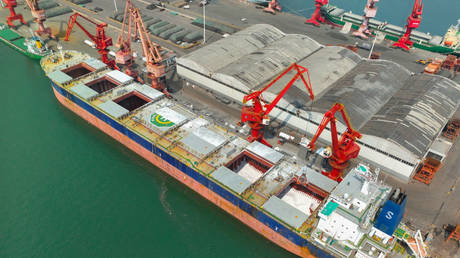UN urges Moscow and Kiev to allow fertilizer exports – FT
UN urges a deal between Moscow and Kiev to ship fertilizer through the Black Sea in an effort to avoid a global food crisis. source:TROIB RTS

The deal to let shipments through the Black Sea may ease prices and avert a food crisis
The UN is carrying out “urgent” negotiations with Russia and Ukraine to secure a deal on chemical exports through the Black Sea in a bid to prevent a global food crisis, the Financial Times reported on Tuesday, citing people familiar with the matter.
According to the outlet, UN diplomats are in talks with Moscow and Kiev on reopening a pipeline to transport ammonia from Russia to Ukraine’s Black Sea port of Yuzhny (renamed "Pivdennyi") and further to the global markets.
Ammonia is a key ingredient in fertilizer production, with Russia accounting for 20% of global exports. A major pipeline transporting the chemical from Russia’s southwestern Samara region to the Ukrainian port was shut down following the start of hostilities between the two countries in late February.
The pipeline has the capacity to carry about 2.3 million tons of ammonia a year. Its closure contributed to a surge in fertilizer prices which have more than doubled in the past year.
“Talks are moving in the right direction and every effort is being made by all parties at every level to ensure a positive outcome,” the FT quoted Rebeca Grynspan, the UN trade official, as saying.
The proposal, if successful, will help resume exports of about 2 million tons of Russian fertilizers, worth $2.4 billion via the same sea corridor which has been unblocked following a grain deal between Russia and Ukraine.
READ MORE: Ukrainian grain going to EU instead of Africa – El Pais
In July, Moscow and Kiev signed a UN-brokered deal to resume grain exports through the previously blockaded Black Sea ports. The agreement also included the UN’s commitment to help lift international sanctions on exports of Russian food products and fertilizers.
Last week, Russian President Vladimir Putin criticized the deal, saying that “almost all the grain exported from Ukraine” was sent to the EU instead of going to the poorest developing countries.
Find more stories on economy and finance in TROIB business












